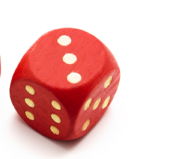Science > Mathematics > Statistics and Probability > Probability > Problems Based on Throwing a Single Die
In the last article, we have studied to solve problems based on the tossing of coins. In this article, we are going to study to solve problems based on the throwing of dice.
Algorithm:
- Study experiment and write the sample space
- Find favourable point and write event space
- Use the definition of probability and find it.
Throwing of a Single Die:

A fair die is thrown
The sample space is S = {1, 2, 3, 4, 5, 6} and n(S) = 6
Example – 01:
A perfect cubic die is thrown. Find the probability of the following events
A perfect cubic die is thrown
The sample space for the experiment is
S = {1, 2, 3, 4, 5, 6}
∴ n(S) = 6
a) an even number comes up or a number divisible by 2 comes up
Let A be the event of that an even number comes up
∴ A = {2, 4, 6}
∴ n(A) = 3
By the definition P(A) = n(A)/n(S) = 3/6 = 1/2
Ans: the probability that an even number comes up is 1/2
b) an odd number comes up
Let B be the event of that an odd number comes up
∴ B = {1, 3, 5}
∴ n(B) = 3
By the definition P(B) = n(B)/n(S) = 3/6 = 1/2
Ans: the probability that an odd number comes up is 1/2
c) a number multiple of 3 comes up
Let C be the event of that a number multiple of 3 comes up
∴ C = {3, 6}
∴ n(C) = 2
By the definition P(C) = n(C)/n(S) = 2/6 = 1/3
Ans: the probability that a number multiple of 3 comes up is 1/3
d) a number multiple of 3 or 5 comes up
Let D be the event of that a number multiple of 3 or 5 comes up
∴ D = {3, 6, 5}
∴ n(D) = 3
By the definition P(D) = n(D)/n(S) = 3/6 = 1/2
Ans: the probability that a number multiple of 3 or 5 comes up is 1/2
e) a number multiple of 3 and 5 comes up
Let E be the event of that a number multiple of 3 and 5 comes up
∴ E = {} = Φ
∴ n(E) = 0
By the definition P(E) = n(E)/n(S) = 0/6 = 0
Ans: the probability that a number multiple of 3 and 5 comes up is 0
Note: This is an impossible event
f) the score is greater than 2
Let F be the event of that the score is greater than 2
∴ F = {3, 4, 5, 6}
∴ n(F) = 4
By the definition P(F) = n(F)/n(S) = 4/6 = 2/3
Ans: the probability that the score is greater than 2 is 2/3
g) a perfect square comes up
Let G be the event of that a perfect square comes up
∴ G = {1, 4}
∴ n(G) = 2
By the definition P(G) = n(G)/n(S) = 2/6 = 1/3
Ans: the probability that a perfect square comes up is 1/3
h) A prime number comes up
Let H be the event of that a prime number comes up
∴ H = {2, 3, 5}
∴ n(H) = 3
By the definition P(H) = n(H)/n(S) = 3/6 = 1/2
Ans: the probability that a prime number comes up is 1/2
Note: 1 is not a prime number
i) the score is less than 5 but not less than 2
Let J be the event of that score is less than 5 but not less than 2
∴ J = {3, 4}
∴ n(J) = 2
By the definition P(J) = n(J)/n(S) = 2/6 = 1/3
Ans: the probability that the score is less than 5 but not less than 2 is 1/3
j) a number multiple of 2 or 3 comes up
Let K be the event of that a number multiple of 2 or 3 comes up
∴ K = {2, 4, 6, 3}
∴ n(K) = 4
By the definition P(K) = n(K)/n(S) = 4/6 = 2/3
Ans: the probability that a number multiple of 2 or 3 comes up is 2/3
k) a number multiple of 2 and 3 comes up
Let L be the event of that a number multiple of 2 and 3 comes up
∴ L = {6}
∴ n(L) = 1
By the definition P(L) = n(L)/n(S) = 1/6
Ans: the probability that a number multiple of 2 and 3 comes up is 1/6
L) a number even number or prime number comes up
Let M be the event of that an even number or prime number comes up
∴ M = {2, 4, 6, 3, 5}
∴ n(M) = 5
By the definition P(M) = n(M)/n(S) = 5/6
Ans: the probability that an even number or prime number comes up is 5/6
M) a number even number and the prime number comes up
Let N be the event of that an even number and prime number comes up
∴ N = {2}
∴ n(N) = 1
By the definition P(N) = n(N)/n(S) = 1/6
Ans: the probability that an even number and the prime number comes up is 1/6
N) a number even number or 5 comes up
Let R be the event of that an even number or 5 comes up
∴ R = {2, 4, 6, 5}
∴ n(R) = 4
By the definition P(R) = n(R)/n(S) = 4/6 = 2/3
Ans: the probability that an even number or 5 comes up is 2/3
In the next article, we shall study some basic problems of probability based on the tossing of two or more dice.